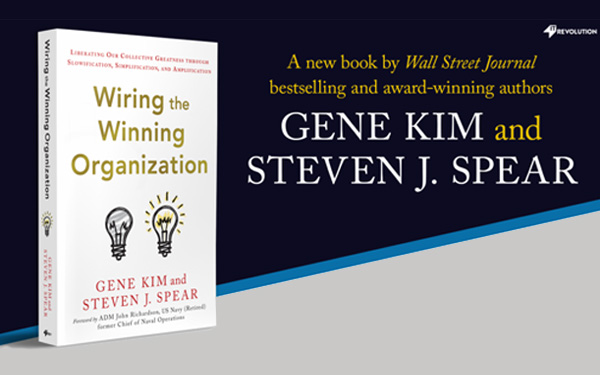What makes the greatest organizations not just succeed but consistently excel? According to MIT Sloan Senior Lecturer Steven Spear (Creating High Velocity Organizations) and Gene Kim (founder and former CTO of Tripwire), highly successful companies have created management systems that liberate people's minds—individually and through collective, creative collaboration—to tackle super hard problems, the solutions to which have enormous societal value. And they can do this better, faster, easier, and more consistently than their counterparts.
In their new book, Wiring the Winning Organization (available November 21), the authors contend that we form enterprises in the first place to tackle problems that would otherwise overwhelm us individually. Finding and deploying solutions requires too much time, expertise, and perspective for any person or small group to master. That's why some organizations comprise thousands of individuals, each contributing their ingenuity toward collective actions and a common purpose.
"In organizations that are led best, all stakeholders benefit: employees invest their time to do work that is appreciated by others; investors gain returns on resources they provide; and the students, patients, customers, and others receive exceptional products and services in exchange for the trust they’ve placed in providers,” write the authors. “In those less well-managed, people’s time is squandered, spirits are squashed, material resources are wasted, and societal needs are left unmet.”
Slowification, simplification, and amplification
The efficiency and innovation in problem-solving are not just a matter of scale but of strategic methodology. Spear and Kim discuss how leading organizations facilitate problem-solving by creating conducive environments, simplifying challenges, and recognizing the need for solutions. They refer to these pivotal mechanisms as slowification, simplification, and amplification. In identifying these mechanisms, they show how familiar practices—lean, agile, six sigma, "containers", DevOps, etc.—all work by liberating people's ingenuity individually and collectively to do accomplish great things.
The book provides varied and numerous examples to demonstrate their point, from NASA's recent deflection of an asteroid to Apple’s triumph in the smart phone market to great medical care achievements. No surprise, Toyota offers tremendous lessons, too. These examples are not mere anecdotes but are underpinned by robust theories from thought leaders and draw on numerous frameworks developed at MIT.
The culmination of a decade-long collaboration between the authors, Wiring the Winning Organization distills their research and experience into essential mechanisms that anyone responsible for coordinating the efforts of other people can use to generate greater outcomes quicker and easier than otherwise would have been possible. “Scale doesn’t matter,” writes Spear in the book’s preface. “Whether it’s five, fifteen, forty-five, or five hundred people, there are ways to set them up for success (or not). This is regardless of whether they’re doing esoteric, upstream research or are involved in the most basic production and delivery of goods and services. And it is regardless of the sector in which they work. There are better and worse ways to bring the parts into an outstanding whole.”

In the book’s foreword, Admiral John Richardson of the US Navy and former Chief of Naval Operations writes, “Wiring the Winning Organization presents a theory of performance. In my experience, the best theories describe complex things in a way that is elegant and simple. The theory set out in this book meets these criteria, presenting the ideas of slowification, simplification, and amplification as mechanisms to consistently create superior performance. Gene and Steve provide a clear and accurate way of understanding the very complex problem of designing an architecture for success.”
The book is currently available for pre-order and will be released Tuesday, November 21, 2023.
Purchase on Amazon
Explore concepts presented in the book firsthand from Steve Spear during his upcoming course, Creating High Velocity Organizations. This course takes a deep dive into the fundamental principles by which unparalleled, relentless improvement and innovation occur. See how those principles work in practice and test how those principles can be applied and translated to your own work.








